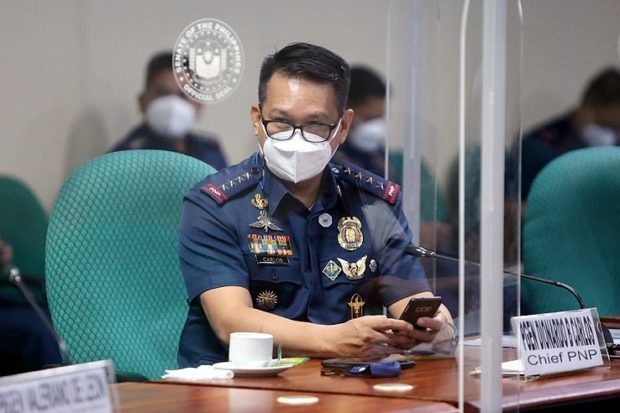PNP says seized firearms in QC bunker could deter election-related violence

Philippine National Police (PNP) chief Gen. Dionardo Carlos (Bibo Nueva España/Senate PRIB)
MANILA, Philippines — The National Capital Region Police Office (NCRPO) discovery of a weapons bunker in Quezon City could be a great help in preventing election-related violence, Philippine National Police (PNP) chief Gen. Dionardo Carlos said on Monday.
Carlos, who praised NCRPO for its quick action, was referring to the Quezon City Police District’s response to concerns from a female resident of Barangay Pasong Tamo about a suspicious looking cache at the basement of their house.
It was revealed that the woman who called the police last Saturday was the daughter of a recently-deceased person who was involved in a shooting incident.
“According to her, she came across a suspicious bunker in the basement of their house following the death of her father. She then reported this to the authorities,” PNP’s Public Information Office said.
Upon responding, QCPD personnel found the following weapons:
- two rifle grenades
- one fragmentation hand grenade
- four pieces of a .38 caliber revolver
- one improvised long firearm
- one 9mm caliber handgun
- 34 pieces of 12-gauge shotgun
- 160 pieces of live ammunition (5.56 caliber) for M-16 rifles
- two magazines of M-16 rifles
“These items or articles can still be used for violent attempts in the future if given to the wrong hands,” Carlos said in a statement, underscoring the timeliness of the operation amid the campaign season.
“We are glad that our police personnel promptly took action to a random report. In the meantime, we are now identifying the owners of these firearms,” he added.
NCRPO said that the recovered explosives were turned over to QCPD’s District Explosive and Canine Unit (DECU), while the other items were given to the Firearms Identification Division for proper disposition.
Meanwhile, NCRPO chief Maj. Gen. Vicente Danao Jr. also lauded the QCPD’s efforts, noting that cooperation between civilians and the police force will always be key in crime prevention.
“The key to any crime solution and prevention is the trust and confidence of our people. Makikita natin na marami pa tayong magagagawa kung ang ating mga kababayan ay makikipagtulungan sa awtoridad,” Danao added.
The Philippines has had a long history of violent elections, especially in provinces where electoral races between rivals and families can get tight and intense. In November 2009, the wife of Maguindanao 2nd District Rep. Esmael Magudadatu and 57 others — including 32 media workers — were killed as Mangudadatu’s camp made their way to file the official’s certificate of candidacy.
The so-called Maguindanao Massacre, which was also the single largest attack on media practitioners stemmed from the electoral race between the Ampatuans and the Mangudadatus.
Mangudadatu was then seeking the gubernatorial seat of Maguindanao, challenging the Ampatuans’ grip on the province. Members of the Ampatuan clan including former Datu Unsay mayor Andal Ampatuan Jr. were convicted last December 2019 for the incident.
READ: WHAT WENT BEFORE: The Maguindanao Massacre
READ: Andal Ampatuan Jr., kin guilty for Maguindanao massacre of 57 people